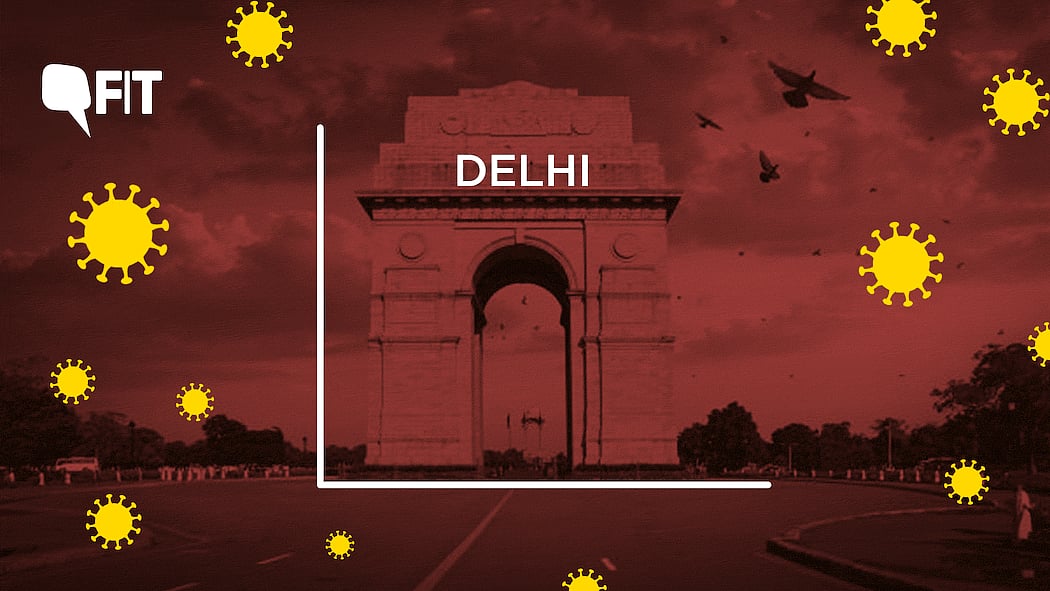
We’re at the Brink: Delhi Doctors on COVID ICU Beds Availability
The national capital is reeling under the pressure of an exponential rise in COVID-19 cases and deaths.

advertisement
The national capital is reeling under the pressure of an exponential rise in COVID-19 cases and deaths over the last few weeks. The consequence of Delhi’s ‘third wave’, as it is being called, is reflecting in its overwhelmed hospitals with insufficient beds to cater to the daily admission requests.
Delhi is presently battling a sharp spike in COVID-19 case, and experts believe that the dismal pollution levels, winter and festive seasons, along with a lapse in following precautions, have all made matters worse. The cases had reached an all-time high of 8,593 on 11 November.
On Wednesday, 19 November, the health data also showed that the number of fatalities recorded over the last 24 hours was 131, which is the highest single-day count in the national capital till date. In a previous article, FIT had explained in detail the possible reasons behind the spike in deaths.
Moreover, an overall lax behavioural attitude in the city around Diwali has led to more exposure among the elderly population, who are at a higher risk of complications.
FIT spoke to doctors from various hospitals, who all said the same thing: Their hospitals are nearly full.
Dr Vijay Dutta, Internal & Respiratory Medicine at Indian Spinal Injuries Centre, said:
Dr Pankaj Kumar, head of critical care unit at Fortis hospital, Shalimar Bagh, also tells us that the hospital has no beds or ventilators available as of 19 November.
At Max Hospital, Saket, the situation is not any better. Dr Arun Dewan, Senior Director (Critical Care) and Associate Director (Internal Medicine), says, “At our hospital, we have always had referral patients from outside states as well. So, we have anyway been full for the past few months. If you look at the last six months, for instance, our occupancy has been close to 100%. When Delhi was not so severely affected, we could still accommodate patients in a few hours time. But now, we are struggling to find ways to do it.”
He adds that not just ICU beds, but the availability of speciality beds is also important to take care of high-intensity patients.
Dr Shuchin Bajaj, Founder Director, Ujala Cygnus Group of Hospitals, says,
He adds that the ICU bed occupation is a 100% in all private hospitals, and it is a very difficult task to get a bed with a ventilator right now.
Last week, FIT had investigated whether the numbers shown on the Delhi Corona app were reflecting the true picture. Discrepancies emerged for both government and private hospitals.
Upon calling Ram Manohar Lohia Hospital, for instance, we were told that the situation changes minute-by-minute. By the time the patient reaches, it is possible that all beds will be full.
The problem seemed to be the lack of real-time data available on the Corona app. In several hospitals we called, the information given on phone did not match the app data.
In addition to the dearth of ICU beds, hospitals are also struggling with inadequate resources and staff, forcing doctors to work for 14 hours on a stretch to handle the double workload, according to a report by The Print.
Measures Taken By the Ministry of Home Affairs
Ten multi-disciplinary teams of the Ministry of Home Affairs, formed to visit more than 100 private hospitals in Delhi to assess bed utilisation and testing capacity and to identify extra ICU beds, have submitted reports, according to the MHA. These reports are presently under consideration of Directorate General of Health Services (DGHS).
Around 500 isolation beds at a COVID care centre in Delhi's Chhatarpur will also be converted to beds with oxygen facility. Beds to be ready by the weekend, reported ANI, citing MHA.
MHA also said that the current capacity of 3,652 ICU beds will be further ramped up.
Reportedly train coaches with 800 beds at Shakur Basti railway station will become functional and doctors and paramedics from the CAPF will main these coaches.
To ramp up Delhi’s medical infrastructure, all 75 doctors and 251 paramedics from the CAPF have reported for duty, said the Ministry of Home Affairs. 50 doctors and 175 paramedics have been deployed at Chhatarpur and Shakur Basti COVID care centres.
Delhi government, according to MHA, has been asked to refer patients needing critical care to these facilities.
Delhi Govt’s Measures
Meanwhile, the Delhi government has directed 42 private hospitals to reserve 80 percent of their total ICU/HDU bed capacity for treatment of COVID-19 patients with immediate effect, reported ANI.
Delhi Health Minister Satyendar Jain took to Twitter to say: “This will increase 260 ICU beds in pvt hospitals for COVID treatment. (Sic)”
Stayendar Jain also tweeted that the Delhi government has ordered 90 private hospitals to reserve 60 percent of their total bed capacity for treatment of COVID-19 patients.
“This will increase 2,644 beds in pvt hospitals for covid treatment,” said the health minister.
Delhi CM Arvind Kejriwal also took to Twitter on Thursday to say:
Earlier in the day, the Delhi CM had informed on Twitter that he met the Lieutenant General and briefed him “about the corona situation in Delhi. We agreed that to create effective deterrent so that people don’t omit wearing masks, we need to increase fine from the present Rs 500 to Rs 2000.”
Lieutenant Governor Anil Baijal had on Wednesday approved the Delhi government’s proposal to allow only 50 guests to attend a wedding, instead of the earlier limit of 200.
(The article was first published on FIT.)
(At The Quint, we question everything. Play an active role in shaping our journalism by becoming a member today.)
- Access to all paywalled content on site
- Ad-free experience across The Quint
- Early previews of our Special Projects
Published: undefined